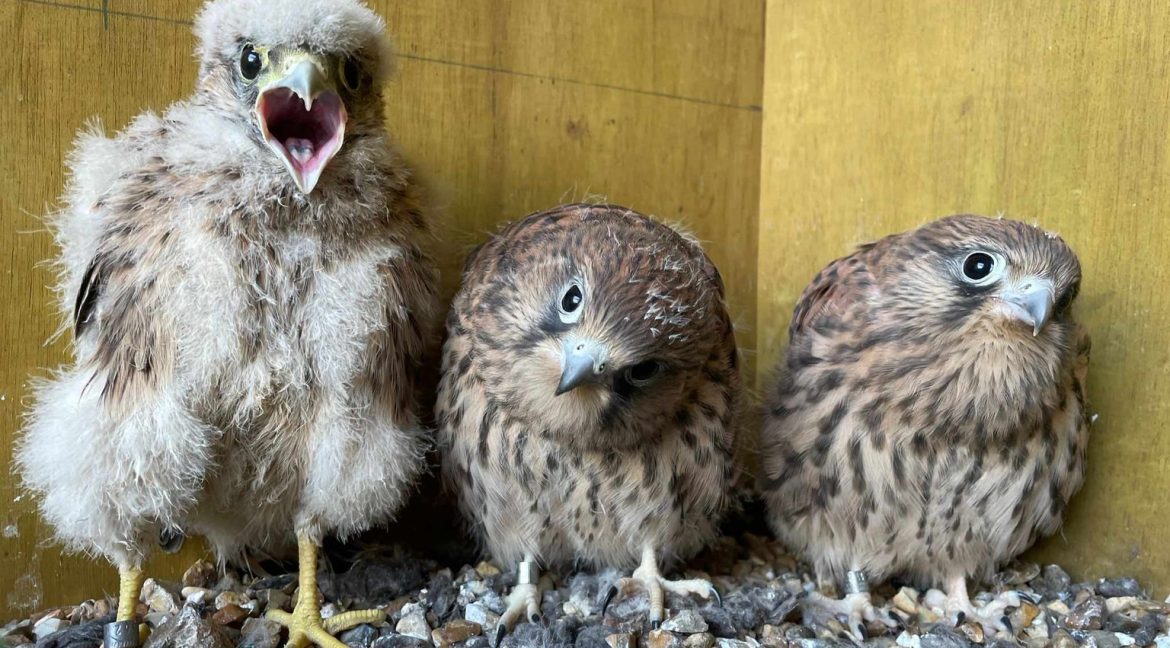In a heartwarming yet bittersweet development, the three young Kestrels that have been under the care of the dedicated team at SOS Wildlife Rehabilitation Center have now been moved to a hack pen. This significant milestone marks the next step in their journey towards becoming wild and independent birds.
The journey of these three Kestrels began several weeks ago when two of them were discovered as helpless and fragile chicks, only a few days old. The team at SOS had to step in and provide round-the-clock care to ensure their survival. Despite their best efforts to prevent imprinting, the young Kestrels grew accustomed to human presence, since their survival depended on constant care during their first critical week.
As soon as they were strong enough, the two Kestrels were resettled in one of the Hospital aviaries, where minimal human contact was maintained. Food was provided through a hatch, and interactions with them were kept to a minimum. Nevertheless, the birds incessantly called out for food whenever they heard certain members of the team in the vicinity.
After a few days, a third young Kestrel was introduced to the aviary. Unlike the other two, this bird had been found in a starved state and exhibited the typical feisty and wild behavior that is expected of Kestrels, even at such a tender age. The hope was that the presence of this truly wild bird would instill a sense of wariness in the other two, urging them to become more independent and less reliant on human interaction for survival.
Recently, all three Kestrels have been ringed and subsequently transferred to a remote location where they can gradually adjust to a life without human contact. Placed in a hack pen, a temporary aviary specially designed to simulate the sights and sounds of their future release area, these young birds will have an opportunity to acclimate to their natural surroundings.
Senior Falconer Jess, who also manages the Raptor Hospital, expressed both sadness and pride as the birds were transported to the hack site. “When we have to provide constant care to young birds in their vulnerable stage, it becomes challenging not to form an attachment,” Jess confessed. “Watching them leave for the hack pen brought a tear to my eye. However, it is thanks to the collective efforts of the team here at SOS that they now have a chance to live as wild and free Kestrels.”
The chosen hack pen site boasts a lush meadow grass cover. During Jess’s most recent visit, she uncovered some cut grass, uncovering a multitude of rodents that had made it their home. This discovery presents the young Kestrels with a perfect opportunity to hone their hunting skills before their eventual release. While the SOS team will continue to supply mice to the hack pen for supplementary feeding, the installation of trail cameras allows for remote monitoring of the birds’ activities, with the hope of witnessing their successful efforts in catching their own meals.
It is expected that the Kestrels will remain in the hack pen for a few more weeks to become fully acclimated to their surroundings. Jess, during her most recent food drop-off, experienced a bittersweet moment when none of the birds showed any interest in her. This behavior is a promising sign that they are gradually becoming more independent and developing the necessary skills to thrive in the wild.
The journey of these three young Kestrels from helpless chicks to independent birds has been a testament to the tireless commitment and expertise of the SOS Wildlife Rehabilitation Center. With every step, they have been guided towards a future that promises their liberation and ultimate integration into their natural habitat. As these Kestrels embrace their wild instincts in the hack pen, we eagerly await the day when they can soar freely in the open skies, a testament to the triumph of compassion, dedication, and rehabilitation.
For more information click here.


